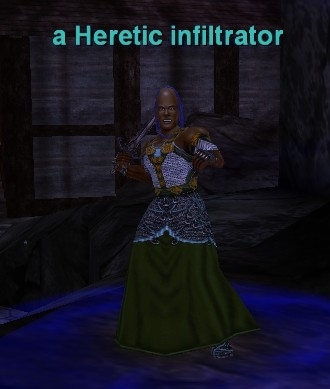MRY
Wormwood Studios

Well, the concept of "playing degenerately" is something I've thought about for a long time, but his label seemed a good one (and is the one used here).
I don't think games need to coerce players to play along with the fiction (though in a narrative game there are reasons to structure the systems to reinforce the fiction). What I do think is that games need to set up incentives that reward players for playing the game in a way that is "enriching." It is really, really easy to get players to play games in a miserable way. Players might not even be miserable while doing so because the Skinner box effects are so great (see, e.g., incremental/clicking flash games). In my view, it is basically morally wrong (!!) to design such a game. For example, if you have a design element that's like, "If the player spends extra time manually clicking the power up spell on each character, he is in a better position than if he uses a spell that powers up every character at once," then you are a bad person. You are basically encouraging players to become drudges, which is exactly the opposite of what escapist (or transcendent) entertainment should provide. So many game systems are like this: the way loot is handled in basically every RPG from Baldur's Gate forward, the way way power-up spells work, the way healing worked in Gold Box games, stat re-rolling, etc. etc. So many reward save scumming, rest spamming, inventory Tetris, item hoarding, skill spamming, dumpster diving, etc.
Players even want these features because game designers have spent a generation turning them into drudges. It becomes impossible for players to distinguish between what they enjoy and find worthwhile in the game and what the game tells them is valuable (see also modern education). "Players will be unable to go onto a new area because they feel compelled to try to find every bit of content in the current area" is not healthy. It's one thing if that's how players replay a game for the 100th time; but it's something else entirely that players feel compelled to work against their own progress in the game even the first time through. Game design should encourage players to think of exploration not as completionist surveying but as the thrill of advancement and seeing new vistas, etc.
Anyway, I'll stop waving my cane at the clouds.
I don't think games need to coerce players to play along with the fiction (though in a narrative game there are reasons to structure the systems to reinforce the fiction). What I do think is that games need to set up incentives that reward players for playing the game in a way that is "enriching." It is really, really easy to get players to play games in a miserable way. Players might not even be miserable while doing so because the Skinner box effects are so great (see, e.g., incremental/clicking flash games). In my view, it is basically morally wrong (!!) to design such a game. For example, if you have a design element that's like, "If the player spends extra time manually clicking the power up spell on each character, he is in a better position than if he uses a spell that powers up every character at once," then you are a bad person. You are basically encouraging players to become drudges, which is exactly the opposite of what escapist (or transcendent) entertainment should provide. So many game systems are like this: the way loot is handled in basically every RPG from Baldur's Gate forward, the way way power-up spells work, the way healing worked in Gold Box games, stat re-rolling, etc. etc. So many reward save scumming, rest spamming, inventory Tetris, item hoarding, skill spamming, dumpster diving, etc.
Players even want these features because game designers have spent a generation turning them into drudges. It becomes impossible for players to distinguish between what they enjoy and find worthwhile in the game and what the game tells them is valuable (see also modern education). "Players will be unable to go onto a new area because they feel compelled to try to find every bit of content in the current area" is not healthy. It's one thing if that's how players replay a game for the 100th time; but it's something else entirely that players feel compelled to work against their own progress in the game even the first time through. Game design should encourage players to think of exploration not as completionist surveying but as the thrill of advancement and seeing new vistas, etc.
Anyway, I'll stop waving my cane at the clouds.












![Have Many Potato [2013] Codex 2013](/forums/smiles/campaign_tags/campaign_potato2013.png)
![The Year of Incline [2014] Codex 2014](/forums/smiles/campaign_tags/campaign_incline2014.png)







